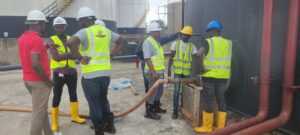Ensuring Compliance: A Guide to API 653, ASME, and IMO Safety Standards for Storage Tanks & Pipelines
Introduction
For businesses in the oil & gas, manufacturing, and maritime industries, maintaining tank and pipeline integrity is not just about safety—it’s about compliance, efficiency, and cost savings. Industry regulations such as API 653, ASME, and IMO standards provide a framework for preventing costly failures, ensuring environmental safety, and protecting assets. However, many Nigerian companies struggle with compliance due to a lack of awareness or expertise.
At Ofimes Tech, we specialize in asset integrity testing, equipment inspections, and calibration services that align with these global standards. In this article, we break down what API 653, ASME, and IMO safety standards mean and why they matter for your business.
What Are API 653, ASME, and IMO Standards?
1. API 653 (American Petroleum Institute Standard 653)
This standard is specifically designed for aboveground storage tanks (ASTs) used in oil & gas, chemical processing, and industrial sectors. It provides guidelines for:
- Inspection frequency (external, internal, and ultrasonic testing)
- Tank repair and alterations
- Welded tank integrity assessments
- Leak detection and prevention measures
✅ Why It Matters: API 653 compliance helps prevent catastrophic tank failures, ensuring that companies avoid environmental hazards, regulatory penalties, and operational downtime.
2. ASME (American Society of Mechanical Engineers) Standards
ASME standards govern pressure vessels, pipelines, and industrial boilers. These include:
- ASME Section VIII – Design and fabrication of pressure vessels.
- ASME B31.3 – Standards for process piping in industrial facilities.
- ASME PCC-2 – Repair and testing of pressure equipment.
✅ Why It Matters: ASME ensures that pipelines and pressure equipment withstand high temperatures, pressures, and corrosive environments, reducing the risk of leaks or explosions.
3. IMO (International Maritime Organization) Safety Standards
The IMO standards apply to maritime operations, particularly storage tanks, pipelines, and safety equipment on ships and offshore platforms. Key regulations include:
- SOLAS (Safety of Life at Sea) – Mandates safe storage and transportation of hazardous materials.
- MARPOL (Marine Pollution) – Focuses on preventing environmental contamination from leaks and spills.
- ISM Code (International Safety Management) – Ensures proper maintenance and inspection protocols for marine storage tanks.
✅ Why It Matters: Compliance with IMO standards protects ship owners, operators, and offshore companies from legal liabilities, financial losses, and environmental damage.
How Nigerian Companies Can Achieve Compliance
Many companies in Nigeria struggle with non-compliance, outdated inspection practices, and substandard safety measures. Here’s how Ofimes Tech helps businesses stay compliant:
✔ Tank & Pipeline Inspections – We conduct ultrasonic thickness testing (UTM), corrosion monitoring, and leak detection to prevent failures. ✔ Calibration & Certification – We ensure accurate volume measurements and compliance with regulatory standards. ✔ Safety Equipment Supply & Servicing – We provide certified PPE, fire suppression systems, and gas detectors to meet IMO, ASME, and API standards. ✔ Regulatory Training – We train HSE teams to implement best practices for asset integrity and compliance.
Conclusion
Ignoring asset integrity standards can lead to huge financial losses, environmental hazards, and legal repercussions. Companies that proactively invest in API 653, ASME, and IMO compliance gain a competitive edge, reduce risks, and protect their assets.
Need help with compliance? Contact Ofimes Tech today to schedule an inspection or consultation!

